Poland "from sea to sea." The death of the Second Polish-Lithuanian Commonwealth - a lesson for modern Poland
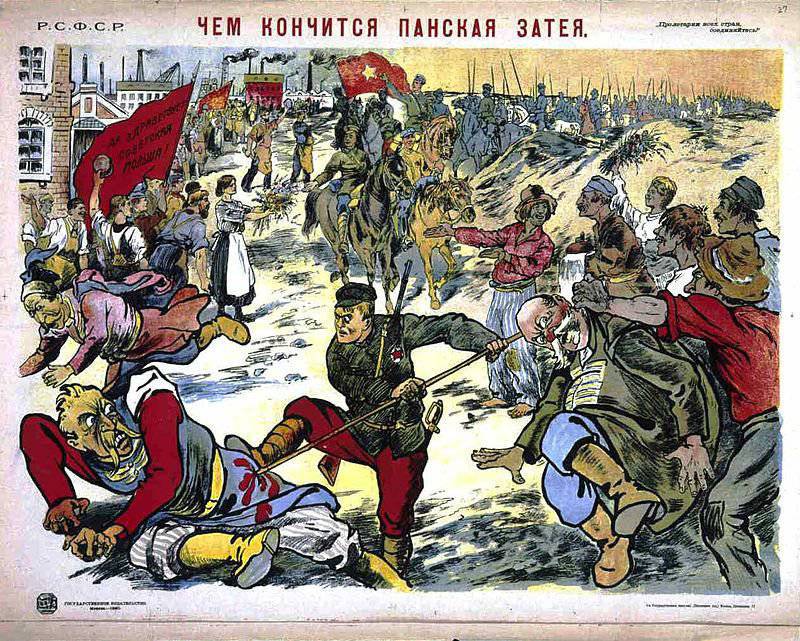
The revival of the construction of the Third Polish – Lithuanian Commonwealth “from sea to sea” by a part of the Polish political elite brings to mind the sad history Speech II Commonwealth (1918-1939). Her story is a good reminder of modern Poland, that all her plans for expansion in the eastern direction end badly.
The participation of Poland, like the USA, in the events of the February revolution in Ukraine-Little Russia cannot be overestimated. Realizing the plans of Washington, London and Brussels to transform Little Russia into a battlefield, Poland, as a vassal of the Anglo-Saxons, plays a big role. Obviously, there will be no European integration of Ukraine. Europe does not need any labor resources (for themselves in abundance), neither industry, nor infrastructure (the most tidbits have already sold or sold). The people of the Ukraine, which 23, zombied by liberal, Russophobic, anti-Soviet and Ukrainizing nonsense, simply used as infantry in the war with Russia. Total war on the border of the Ukraine and the Russian Federation should grind thousands of passionate Slavic guys who believed in the myth of the "great history of ukrov." And also to destroy the economy and infrastructure of the regions covered by the war (and the expansion of the zone of military operations is almost inevitable), to cause a wave of hundreds of thousands and millions of refugees and eventually cause a new famine and mass death from disease. Little Russia wants to bleed, sacrificing millions of lives of Slavs-Rus. Its remnants should become a springboard for aggression against the rest of the Russian civilization.
In this part of the territory of the Ukraine wants to absorb Poland. In Poland, they again recall the “Great Poland” from the Baltic to the Black Sea. Former Polish President A. Kwasniewski has already expressed the idea that the president of Ukraine should be a Pole who will restore order in the country and implement a plan for building Poland from sea to sea. The former director of the National Security Bureau, one of the associates of the former head of the Polish state Kwasniewski and MEP from Poland Marek Sivec explicitly stated: “Poland is obliged to fully support the idea of dividing Ukraine and to do everything so that it comes as soon as possible. that Moscow will again subjugate the Russian-Ukrainian Ukraine. ” First of all, the Polish radicals claim to the Volyn, Ivano-Frankivsk, Lviv, Rivne and Ternopil regions. These areas supply workers to Poland who know the Polish language and are perfectly assimilated into Polish culture. Therefore, there will be no special problems with the assimilation of these areas to Poland; they can become the “Outskirts of Poland”.
Poland is faced with the task of creating political conditions for the separation of the western regions of Ukraine. Hence the touchstones that Poland launches regarding the partition of Ukraine. So the speaker of the Polish Sejm, Radoslav Sikorsky, announced that allegedly in 2008, Russian President Vladimir Putin suggested that the then Polish Prime Minister Donald Tusk, who was coming to Moscow (he would soon become head of the European Council), divide Ukraine. Sikorsky allegedly quoted Putin as saying: “Ukraine is an artificially created country, and Lviv is a Polish city, and why don’t we settle this problem together.” In fact, it is probing Moscow (and other forces) for the division of Ukraine and gradually introducing into the international relations the idea of a new redistribution of borders (changes in the architecture of the world community). True, Tusk himself immediately said that he had never heard anything like this from the head of Russia. But the job has already been done. The trial ball has been successfully launched.
Recently, Sikorsky continued to develop a raised topic. Speaking 20 November at Harvard University, he рассказал to the Americans, that Poland “due to the firm policy of reforms and joining the Atlantic structures” can be an example for Ukraine, leading it in the direction needed by the West. As a result, Poland can fulfill the civilizing mission in Ukraine. True, Russia is hindering this process. Therefore, according to Sikorsky, "the military alliance of the West must return to its original mission - the intimidation of Russia." The similar role of Ukraine was predicted by the Minister of Foreign Affairs of Poland Grzegorz Schetyna. He compared the relations of Poland and Ukraine with the relations of Western European countries with their former colonies in Africa. “Discussing Ukraine without Poland is like solving issues of Libya, Algeria, Tunisia, Morocco without the participation of the French, Italians, Spaniards,” the head of the Polish Foreign Ministry said.
Thus, the old gentry ambitions have not yet been eradicated from the Polish heads. The death of the First and Second Rzecz Pospolita, which destroyed the ambitions, the exorbitant pride and greed of the Polish "elite", have already been forgotten. In relation to the "Ukrainian flakes" proud arrogant Polish gentry again see themselves as "civilized colonizers." The history repeats on a new historical turn. However, blinded by the myth of the “Russian threat”, historical grievances against Russia and revanchist claims, Warsaw forgets what the previous attempts to restore the Polish-Lithuanian Commonwealth from sea to sea ended.
Creating the Second Polish Commonwealth
The collapse of the Russian Empire and the defeat of the German Empire allowed the Poles, with the support of the Entente, to recreate their own state. The Versailles Peace Treaty in 1919 gave Poland most of the German province of Posen, as well as part of Pomerania. Poland received access to the Baltic Sea. True, Danzig (Gdansk) was not part of Poland, but received the status of a “free city”. In addition, during a series of Polish uprisings, Poland withdrew part of Silesia.
From the very beginning of the creation of the Second Polish-Lithuanian Commonwealth, it aimed at confrontation with Russia. In the east, then there was no clear boundary. In the Ukraine, Ukrainian nationalists tried to take power into their own hands. So, at the end of October 1918, the Ukrainian nationalists seized Lviv. The Poles, who in the beginning of the 20th century in the Lviv region accounted for up to 40% of the population, put up armed resistance. At the same time, Polish troops occupied Przemysl, the Romanians - part of Bukovina, and Transcarpathia remained behind Hungary. In November, the Poles drove the Ukrainian nationalists out of Lviv and continued the offensive. At this stage, the Bolshevik government did not participate in this fight, there were many other problems. But France, recalling its traditional ties with Poland, redeployed 60-thousand to help the government of Jozef Pilsudski. army of Joseph Gallen. The soldiers in this army were mostly Poles, and the officers were French. The troops were equipped with French weapons. Paris planned to use the Poles to fight the Bolsheviks. However, Pilsudski first decided to solve the problem of access to the Black Sea. In the spring of 1919, Polish troops crushed the West Ukrainian People's Republic (ZUNR). In the summer of 1919, Polish forces crossed the Zbruch River and entered East Little Russia.
Soviet Russia then was extremely difficult to resist the aggression of Poland. The Soviet Republic did not have a regular army, since the tsarist army had already collapsed. In the spring of 1918, the headquarters of the Western division of the veil detachments was established; it was to protect the western border of Soviet Russia. For this, it was necessary to rebuild guerrilla-type formations into a regular army. As a result, they created the Western Defense District with headquarters in Smolensk, soon transformed into the Western Army.
The dictator Pilsudski was a clever man to openly declare the re-establishment of the Commonwealth within the previous boundaries. He announced the same idea under cover, putting forward a plan to create a federation of states created in the western territories of the Russian Empire (up to Tiflis). The leader in this federation, of course, was Poland. In fact, modern Polish politicians are promoting the same idea - the European integration of Ukraine should be led by Poland.
Moscow understood that a collision was inevitable. The Western army began to move. However, initially it was difficult to call it an “army” - 10 total of thousands of bayonets with a dozen guns (border guards, the Pskov division, the 17-Infantry Division - it included the Vitebsk and Smolensk divisions). The offensive of the Western army at the end of 1918, the year passed without much resistance, but as the troops moved to the west, the resistance of the Poles increased.
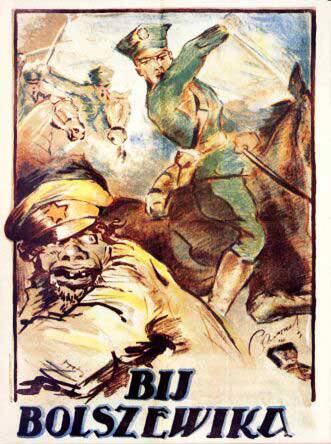 Soviet-Polish war
Soviet-Polish warMoscow tried to negotiate with Warsaw. First, through the Russian Red Cross. However, by order of the Polish government in January 1919, the delegation of the Red Cross was shot. In January, 1919, Lenin proposed to establish the Lithuanian-Belarusian Republic (Litbel). The government of Litbel proposed to Poland to enter into negotiations on the establishment of a common border. But Pilsudski also ignored this peaceful offer.
After settling the situation on the border with Germany, the Poles were able to transfer additional forces to the east. In the spring of 1919, Polish troops occupied Slonim and Pinsk. In April, Pilsudski offered to the nationalist government of Lithuania to restore the Polish-Lithuanian union, but was refused. Therefore, when Polish forces drove the Reds out of Vilna, the occupied lands fell under the jurisdiction of Poland. After this, there was a long lull on the Soviet-Polish front. It was caused by the internal and external problems of Poland and Soviet Russia. Soviet Russia fought in the ring of fronts with the white armies of Denikin, Kolchak, Yudenich and Miller. Pilsudsky was somewhat scared and Denikin’s march against Moscow, this white general, unlike many other idle talks, in fact stood for a “united and indivisible” Russia. The Poles themselves in the west faced the Germans, and in Galicia with the Ukrainian nationalists. Strong crop failure in Poland itself did not add confidence. In August, the miners revolted in 1919, in Silesia. Polish troops suppressed unrest, but the tension in Silesia remained.
In December, the Entente powers 1919 announced the Declaration on the temporary eastern borders of Poland. The frontier should have become the line of predominance of the ethnic Polish population from East Prussia to the former Russian-Austrian border on the Bug. 22 December 1919. The Soviet government again proposed Warsaw to immediately begin negotiations to conclude a "lasting and durable peace." However, Warsaw was silent, it did not need peace.
2 February 1920. Moscow again repeated its proposal for peace. February 22 the same proposal sent to Soviet Ukraine. March 6 peace offer repeated. It should be noted that in this period the Entente powers had already abandoned the idea of intervention in Russia, it failed. In January, 1920 England reported to Poland that it could not recommend Warsaw’s war policy, since Russia no longer poses a threat to Europe. 24 February The Supreme Council of the Entente declared that if the Polish government makes excessive demands on Moscow, then the Entente will not help it if Rossi gives up the world. Thus, the Western powers washed their hands, not wanting to get involved in a new war in the east. At the same time, they carried out large-scale deliveries of weapons. The refusal of the Western powers to intervene in the war did not stop Poland.
Meanwhile, the Soviet government was able to win over most of the territory of Russia. The Red Army completely crushed the army of Kolchak and Denikin. Admiral Kolchak was shot. Denikin surrendered command and went to Europe. Remains of white troops under the command of Wrangel entrenched in the Crimea. Peace was signed with the Estonian government, and a truce was concluded with Latvia.
Soon the lull was over. In March 1920, the Polish army launched an offensive. During the lull, all resources were focused on strengthening the army. If in the 1918 year, the Polish army consisted of volunteers, then in January 1919, the first forced recruitment of young men born in 1899 was announced. In March, the Seym of the 1919 introduced universal military service and announced the appeal of five ages - 1896-1901. of birth. Part of the Gallen Army (five divisions) arrived from France. After the defeat of Denikin's army to Poland, the division of General Zeligovsky (it was formed from the Poles) was transferred from the Kuban. As a result, by the spring of 1920, a powerful strike fist was formed: 21 infantry division and 2 brigades, 6 cavalry brigades, 3 separate cavalry regiment, 21 field artillery regiment and 21 heavy artillery division (all XNUM-NNMX). In April 189, the Polish army consisted of 63 ths bayonets and sabers.
In the early summer of 1920, when the Red Army went on the offensive, a call was made in Poland for the youths of 1895-1902. birth, in July - 1890-1894, in September - 1885-1889. At the same time, in September 1920, they began to form a volunteer army. Thus, at the time of the most difficult battles, Poland called on 16 age categories, gathered about 30 thousand volunteers, bringing the total army to 1,2 million people. The armament of the Polish army was extremely diverse. Most of the weapons were from the Russian, German and Austro-Hungarian armies. In addition, at the end of 1919 - beginning of 1920, the USA, England and France supplied weapons. So, almost 1500 guns, 2800 machine guns, 385,5 thousand rifles, 42 thousand revolvers, 200 armored vehicles, 576 million rounds, 10 million shells, 3 million sets of uniforms, communications equipment, and medicines were delivered to Poland at that time. , shoes, etc. As part of the Gallen army, which arrived from France, Poland received the first tank connection - tank regiment (120 light French tanks).
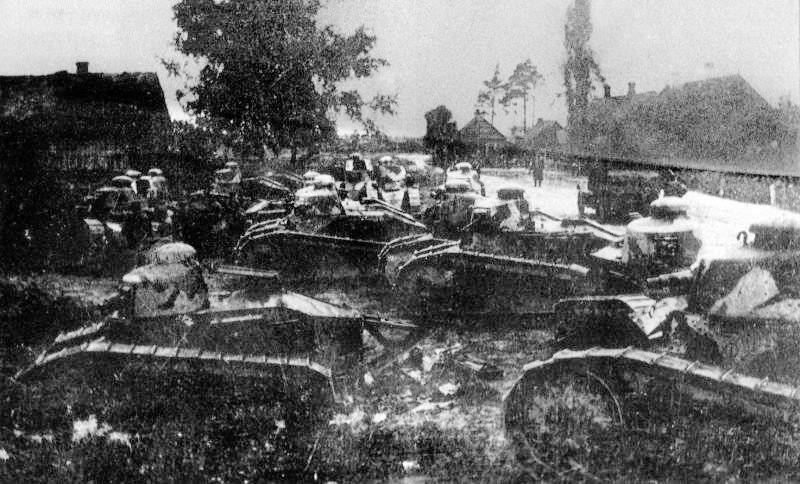
Polish 1 Tank Regiment near Daugavpils
Polish troops opposed the Western and Southwestern fronts of the Red Army. By 1 April, 1920 had more than 62 thousand bayonets and sabers on the Western Front with 394 guns and 1567 machine guns. In the South-Western Front there were 28,5 thousand people with 321 guns and 1585 machine guns.
In mid-February, 1920, the Chief of Operations of the Shaposhnikov headquarters, in his report noted the contours of the future plan of military operations against Poland. Poland was identified as the probable opponents of Russia, and also, possibly, Latvia and Lithuania, if Poland resolves the issue of Vilna in the interests of the Lithuanians. Regarding Romania, they believed that she would not speak, since she had already decided the question of Bessarabia in her favor. Shaposhnikov believed that the main theater would be the region north of Polesye. Indeed, here the defeat of the Soviet troops could lead to the offensive of the Polish army in Smolensk and Moscow, and in the event of the failure of the Poles, the Red Army could move to Warsaw.
However, Pilsudski decided to hit Ukraine (Little Russia). His goal was not a decisive defeat of the Red Army, but the capture of Little Russia and the creation of a “Greater Poland” within the historic borders of the Commonwealth of the Year 1772. As Pilsudski himself noted: “Closed within the boundaries of the 16th century, cut off from the Black and Baltic Seas, deprived of the land and fossil riches of the South and Southeast, Russia could easily become a second-rate power, unable to seriously threaten the new-found independence of Poland. Poland, as the largest and strongest of the new states, could easily secure a sphere of influence that would extend from Finland to the Caucasus Mountains. ” Pilsudski was eager for fame, perhaps, for the Polish crown (there were persistent rumors in Warsaw that the Polish dictator wanted to become a monarch), and Poland for Western Russian lands and bread.
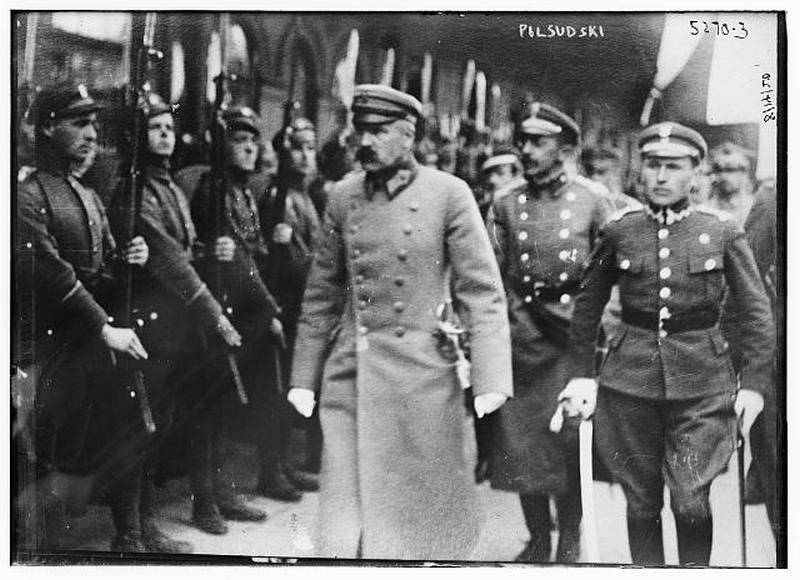
Jozef Pilsudski in Minsk. Xnumx
After the war, Polish historians in hindsight began to rewrite history and to prove that the insidious Bolsheviks from Ukraine wanted to attack Poland. In reality, the chairman of the Revolutionary Military Council, Trotsky and the commander-in-chief, Kamenev, were going to first defeat the White Army of Wrangel and only then go to Poland. Kamenev, in April 1920, informed the commander of the Southwestern Front that the operation to capture the Crimea was the first priority, and all the front forces had to be thrown at it, regardless of the weakening of the Polish direction. In addition, the rear of the Red Army was extremely unstable. In the south-west of Russia, a wave of mass banditry. Little Russia was overrun with weapons that remained of the tsarist, Germanic, Austro-Hungarian, Petliura, White and Red armies. Many thousands of people were divorced from a peaceful life, learned to work, and lived in robberies. All sorts of "political" and just bandits were rampant.
In early January, 1920, the troops of Edward Rydz-Smigly took Dvinsk. In March, the Poles launched an offensive in Belarus, capturing Mozyr and Kalinkovichi. 25 April 1920, the Polish troops attacked the position of the Red Army across the Ukrainian border. The position of the Soviet troops worsened the mutiny of the 2 and 3 of the Galician brigades. Polish intelligence worked well in these units. Anti-Soviet agitation among the personnel of the two brigades led to open rebellion. This insurgency completely destroyed the grouping of the 14 army of Uborevich. The army and division reserves of the 14 and partially 12 armies had to solve the problem of suppressing the insurrection and restoring the integrity of the front. This contributed to the rapid advance of the Polish troops. In addition, in the rear stepped up all sorts of gangs, including the nationalist sense.
Already on April 26, most units of the 12 Army lost contact with the army headquarters. 27 April control of the 12-th Army finally collapsed. May 2 Red Army troops retreated across the river Irpin. 6 May, Soviet troops left Kiev. 8-9 May, Polish forces captured a bridgehead on the left bank of the Dnieper. Attempts by the 12 Army to dump the Poles into the river did not lead to success.
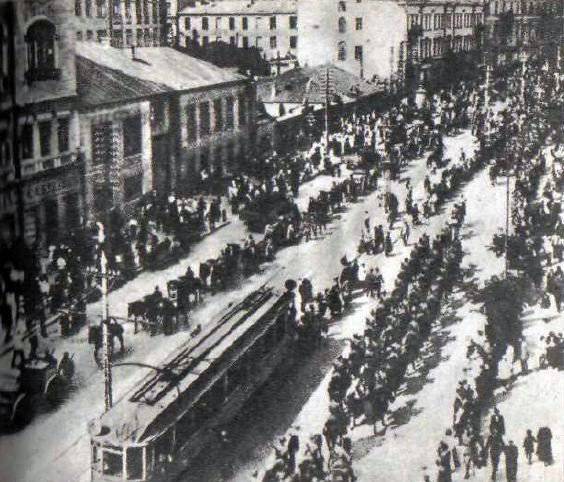
Polish troops in Kiev
15-16 May went heavy oncoming battles. The strategic initiative in the south-western direction gradually began to pass into the hands of the Red Army. The 1 Cavalry Army, commanded by Seeds Budyonny (more than 16 thousand sabers with 48 guns and 6 armored trains), was transferred from the Caucasus. The Red cavalry defeated the Makhno gang in Gulyaypole. On May 26, after concentrating all units in Uman, Budyonny's troops attacked Kazatin. June 5 units of Budyonny broke through the front of the enemy and went to the rear of the Polish troops, quickly advancing on Berdichev and Zhytomyr. 10 June 3-I Polish Army Rydz-Smigly, to avoid encirclement, left Kiev. The Red Army entered Kiev. In early July, General Berbetsky’s troops launched a counterattack against the red cavalry at Rovno, but they repelled it. 10 July Soviet units occupied Rivne.
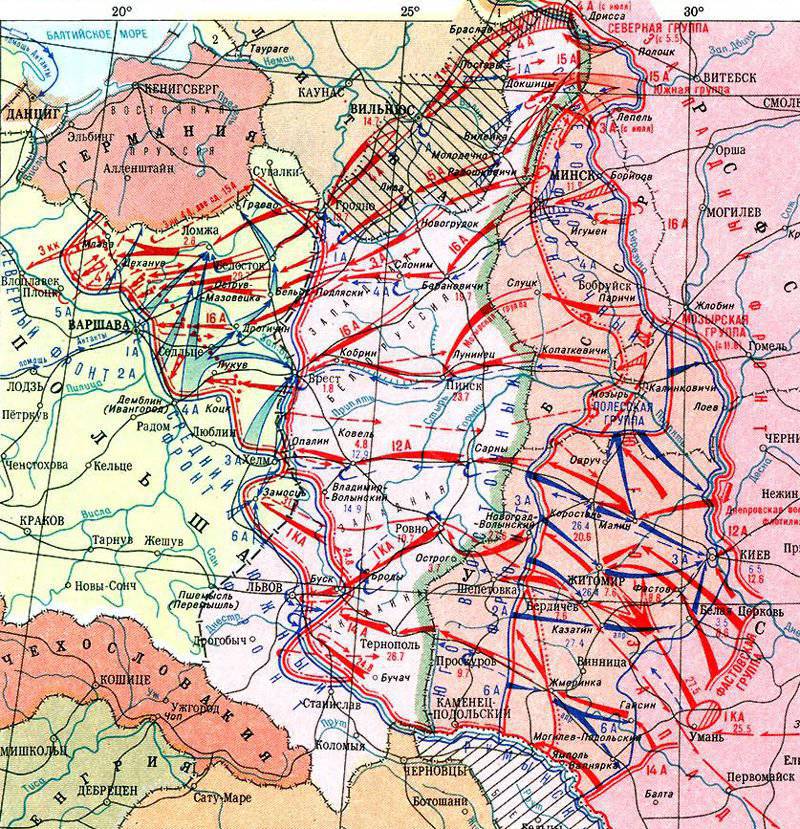
To be continued ...
Information